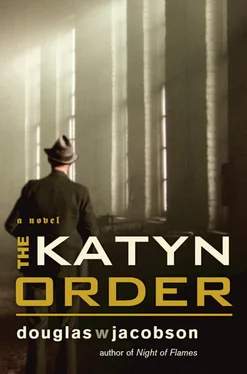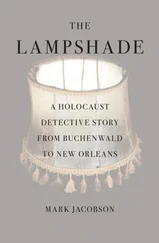Whitehall was silent for a long moment. “Well, that might explain something,” he said finally.
“What do you mean?”
“The Russians are causing some trouble. Our delegation in Berlin was contacted by Major Tarnov of the NKVD, damned nasty chap, I must say. They’ve slammed the door on any further visits to Sachsenhausen. And now Tarnov is demanding that all records relating to Hans Frank be off-limits until they complete their investigation.”
“Investigation of what?”
“The connection between Ludwik Banach and Hans Frank—and Banach’s activities after he returned to Krakow.”
Adam almost dropped the phone. “Oh Christ! They think Banach collaborated with the Nazis.” He slumped back in the leather desk chair and stared at the ornately carved wooden beams in the ceiling of the former Nazi’s study. “This whole thing is insane,” he snapped. “My uncle has been back in Krakow since 1940, and I never knew. I was gone, doing what you trained me to do. Doing things that—”
“He’ll start looking for him,” Whitehall said.
“What?”
“This NKVD agent, Tarnov. He’ll start looking for Banach.”
Adam suddenly felt dizzy. “We’ve got to find him first.”
“Do you have a contact?” Whitehall asked. “Someone in the AK who was in Krakow, someone who might know where to start?”
“I don’t know… they’re all gone… they’re…” Adam closed his eyes to let the dizziness subside. Slowly an image formed in his mind, an image of Natalia sprinting toward a sewer in Warsaw, wearing her blue railway conductor’s uniform. That was her code name, Conductor. She had mentioned it that last night in Warsaw, in the ammunition cellar. “Not very original as code names go,” she had said. Snatches of the conversation gradually came back to him. Just before the artillery shell hit and they bolted out of the cellar, Natalia had said, “I heard from a priest…”
And then… what else? There was something else, something he had been trying to remember for weeks. Adam forced himself to concentrate, trying to recall her exact words. “I heard from a priest, of all things… then someone I never met…”
It struck him like a thunderbolt.
“…someone I never met, called the Provider.”
Adam abruptly stood up, squeezing the telephone receiver, his knuckles turning white. Of course! How could I have missed it? Natalia had never finished the thought, but now it was suddenly clear.
The Conductor… The Provider.
She was part of the channel!
“There may be someone,” he said into the telephone. “Someone I knew…”
“What’s his name?” Whitehall asked.
“Her name,” Adam said. “Her name is Natalia.”
6 JUNE
KRAKOW’S MEDIEVAL STARE MIASTO DISTRICT stretched for almost two kilometers along the Royal Way, from the Gothic tower of St. Florian’s Gate in the north to Wawel Castle, high above the banks of the Vistula River, in the south. And in the center of the district, encircled by the wide pathways and greenery of the Planty park, was the Rynek Glowny, the largest market square in Europe, and since the thirteenth century, the heart and soul of the City of Kings.
Natalia walked briskly across the Rynek Glowny and continued south, along the narrow, cobblestone streets of the Stare Miasto, struggling to suppress her anxiety about being back in the city after months of hiding out in forests and AK safe houses. She knew she should keep moving, blending in with the pedestrian flow so as not to attract attention.
But she paused for a moment at the base of Wawel Castle and glanced up at the towering edifice of the royal palace and the adjoining cathedral where every Polish monarch for a thousand years had been coronated. Flags fluttered from the towers high above the stone fortifications that surrounded the castle. They were Soviet flags now, the hammer-and-sickle having replaced the swastika since she’d last been here. The Russians had driven out the Germans, the flags had changed, and the black uniforms of the SS were replaced with the khaki uniforms of the NKVD.
Natalia sighed and turned away from the castle, following the route she had taken dozens of times over the years, through the tree-lined paths of the Planty park then along a labyrinth of narrow, Medieval streets where the rich ensemble of Gothic, Renaissance and Baroque architecture remained unscathed by the war that had ravaged the rest of the country.
The Stare Miasto was crowded at this hour, but subdued. There were few vehicles, and pedestrians avoided conversation with strangers, averting their glances as they’d been conditioned to do through the long, dark period of occupation. The shops had little to sell, the cafés offered only a few meager selections and the hundreds of churches were mostly empty under the atheist influence of the communist occupier.
Natalia continued on, moving briskly, avoiding eye contact. She made her way along the boulevards bordering the Vistula River to the Kazimierz District, once a separate city and for three hundred years the home of Krakow’s Jewish quarter. It was a familiar route, a familiar city, remarkably undamaged yet inexorably altered, its royal soul deadened.
Twenty minutes later, in the heart of Kazimierz, Natalia walked down a long narrow street, lined with stone walls on either side, and entered the courtyard of the Church of Archangel Michael and Saint Stanislaus. A rose garden was in full bloom, and an elderly man hunched over, clipping grass at the base of a towering oak tree. The tree shaded a rectangular pond with a granite statute of the saint at its center.
Natalia wore stout shoes and dark trousers, a white long-sleeved shirt and a gray vest. Along with her felt hat and short brown hair, she could be taken for a man by a casual observer, which was safer than a woman alone. But caution was a habit, and she turned away from the elderly man.
She glanced at her watch. It was one o’clock in the afternoon. And it was the sixth of June, a Wednesday. She paused for a moment, studying the red-brick church building with its twin towers and high-peaked tile roof, then slowly climbed the curved, limestone staircase. With her cap folded under her arm she entered the gloomy sanctuary.
There was a faint odor of incense in the air, and she waited a moment for her eyes to adjust. Then she knelt, made the sign of the cross and slipped into the last pew on the right, the one closest to the confessional in the rear of the sanctuary. There were several people ahead of her, and she withdrew a rosary from her pocket. She closed her eyes, absently fingering the beads, thinking about the extraordinary message that had brought her back here.
It had arrived on her last day at the AK safe house in Zyrardow. The NKVD had been closing in, investigating the shooting of the two agents, and it was time to move on. Zeeka had made contact with another AK cell in Lodz and had sent Hammer and Rabbit on ahead. But as Natalia and Zeeka were gathering their things, the AK wireless operator came down from the attic with a message.
“From Lodz?” Zeeka asked.
The wireless operator shook his head. “It’s from SOE in London. It was sent several days ago, but it was routed through three different cells before I got it.” He handed Natalia the message. “It’s for you.”
“From the SOE in London? Are you sure it’s for me?”
“It’s addressed to ‘The Conductor’ and that’s you,” he said with a shrug.
Natalia hesitated then unfolded the paper and read the decoded message:
MUST LOCATE PROVIDER
REPEAT: LOCATE PROVIDER
Avoiding trains and keeping to the back roads and small villages, it had taken Natalia a week to get to Krakow. She had traveled first with Zeeka as far as Lodz, where she parted with her friends and comrades-in-arms. Rabbit had wanted to go with her, but whatever awaited her in Krakow, Natalia knew that she had to do this alone.
Читать дальше












